北师大版英语高二选修六 Unit 16 Stories Vocabulary课件 (共37张PPT)
文档属性
| 名称 | 北师大版英语高二选修六 Unit 16 Stories Vocabulary课件 (共37张PPT) |  | |
| 格式 | zip | ||
| 文件大小 | 1.3MB | ||
| 资源类型 | 教案 | ||
| 版本资源 | 北师大版 | ||
| 科目 | 英语 | ||
| 更新时间 | 2020-05-01 15:53:40 | ||
图片预览


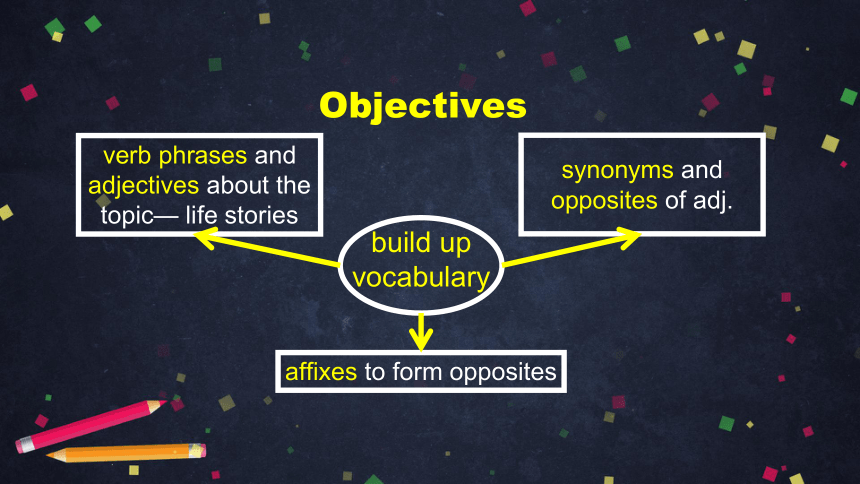
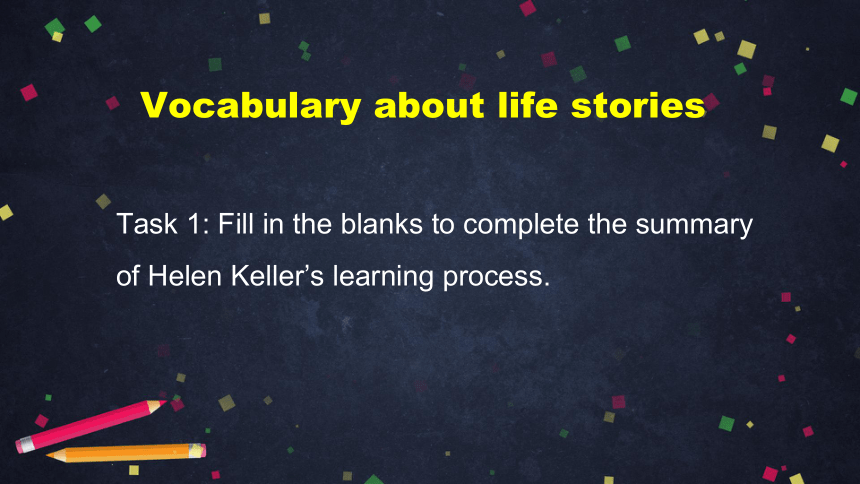
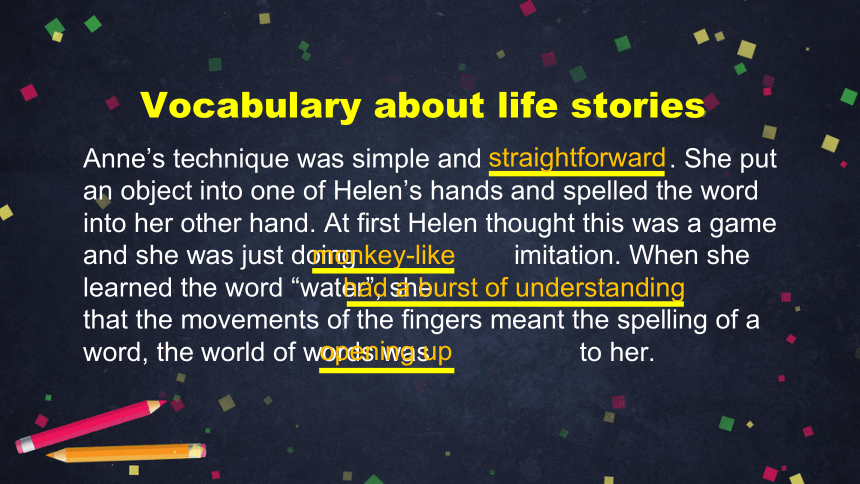

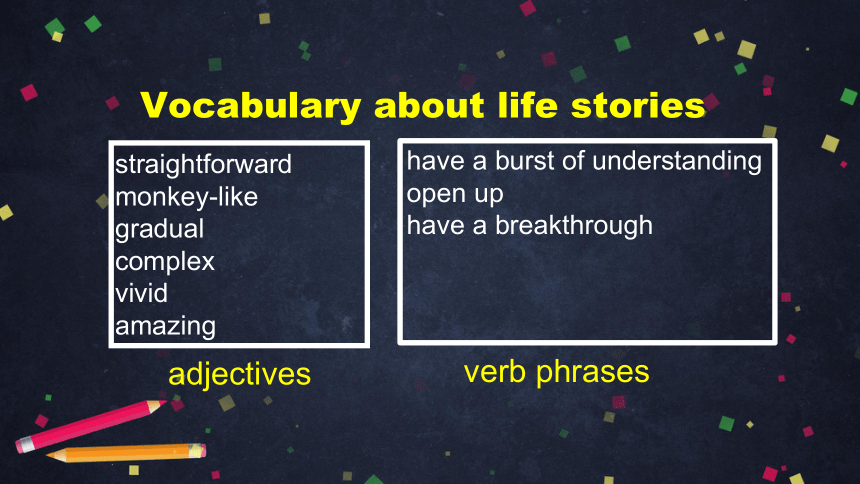
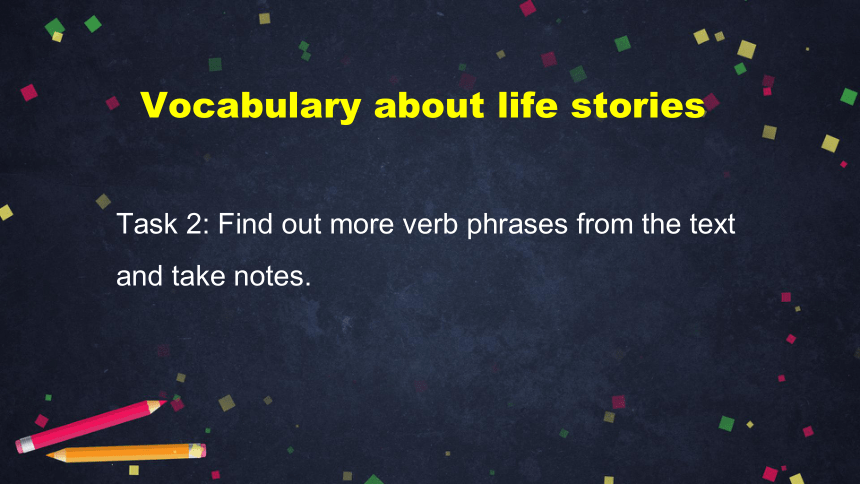

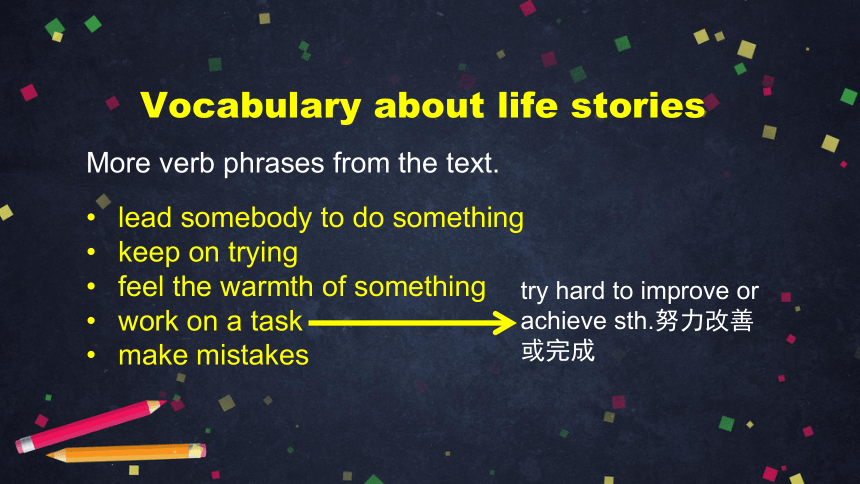
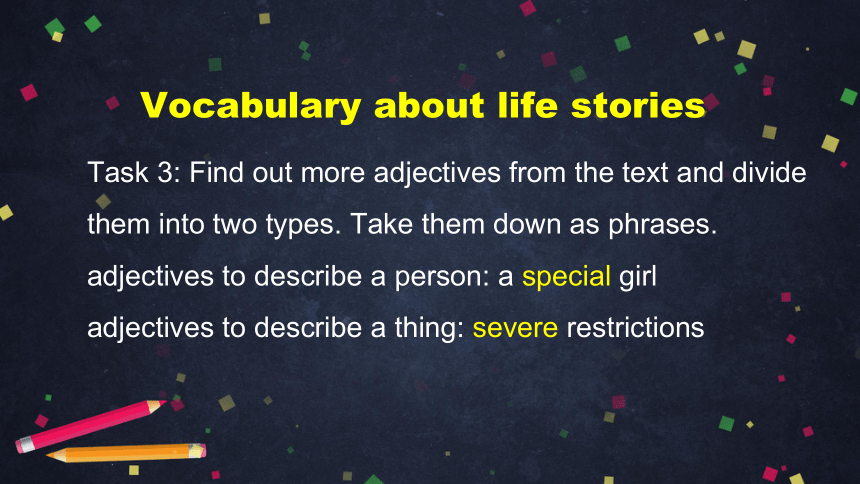
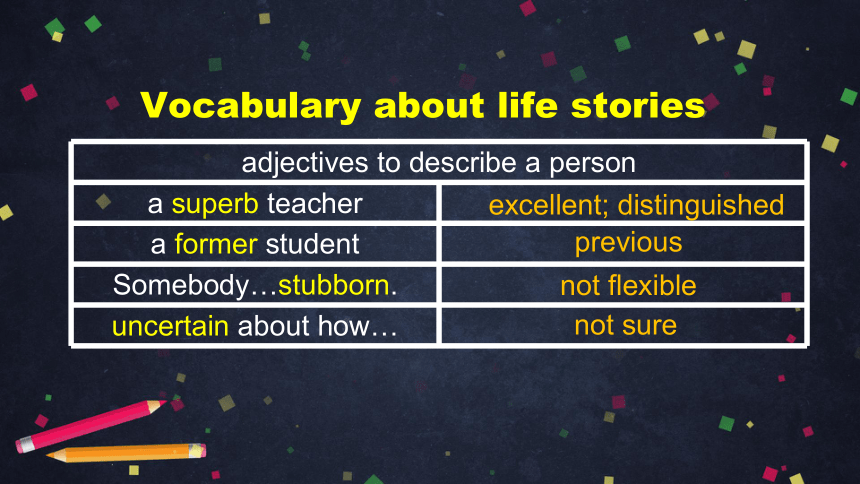
文档简介
(共37张PPT)
选修六 Unit 16 Stories (6)
高二年级 英语
Lesson 3 Life Stories
Vocabulary
Objectives
build up vocabulary
verb phrases and adjectives about the topic— life stories
synonyms and opposites of adj.
affixes to form opposites
Vocabulary about life stories
Task 1: Fill in the blanks to complete the summary of Helen Keller’s learning process.
Anne’s technique was simple and . She put an object into one of Helen’s hands and spelled the word into her other hand. At first Helen thought this was a game and she was just doing imitation. When she learned the word “water”, she that the movements of the fingers meant the spelling of a word, the world of words was to her.
straightforward
opening up
Vocabulary about life stories
monkey-like
had a burst of understanding
Helen was eager to learn more, but it was a and painful process. The word “love” puzzled her very much because she didn’t understand anything unless she touched it at that time. “Think” was the first word Helen had understood. She in her learning. Finally in a moment, she understood the beautiful truth of love. The results were .
gradual
complex
had a breakthrough
amazing
Vocabulary about life stories
vivid
Vocabulary about life stories
straightforward
monkey-like
gradual
complex
vivid
amazing
adjectives
verb phrases
have a burst of understanding
open up
have a breakthrough
Vocabulary about life stories
Task 2: Find out more verb phrases from the text and take notes.
Vocabulary about life stories
More verb phrases from the text.
be brought in
relate to something
give somebody a big hug
give somebody hope and joy
be invited请来
be able to understand and have sympathy with sb./sth.
能够理解并同情
Vocabulary about life stories
More verb phrases from the text.
lead somebody to do something
keep on trying
feel the warmth of something
work on a task
make mistakes
try hard to improve or achieve sth.努力改善
或完成
Vocabulary about life stories
Task 3: Find out more adjectives from the text and divide them into two types. Take them down as phrases.
adjectives to describe a person: a special girl
adjectives to describe a thing: severe restrictions
Vocabulary about life stories
adjectives to describe a person
a superb teacher
a former student
Somebody…stubborn.
uncertain about how…
excellent; distinguished
previous
not flexible
not sure
Vocabulary about life stories
adjectives to describe a thing
severe restrictions
precious knowledge
precise description
The meaning…apparent.
serious
valuable and important
clear and accurate
obvious
Vocabulary about life stories
What is the use of adjectives and verb phrases in stories?
Adjectives and verb phrases are used in stories to give us more vivid descriptions and show us directly the feelings and thoughts of the characters.
Summary: strategies to
build up vocabulary
1. Build up the vocabulary about a topic, e.g. life stories.
2. Build up the vocabulary as collocations, e.g. verb phrases and adjective + noun phrases, so that you can use them properly in your writing.
Vocabulary: synonyms
Task 4: Find words in the text that have the same meaning as the words in the brackets.
Example: We had a superb (distinguished) English teacher last year.
Vocabulary: synonyms
She’s been in the hospital for a week because she has a (serious) case of the flu. (para.1)
Nothing is more (valuable) to me than my good health. (para.4)
We’re very (keen) to learn all we can about our new computer. (para.5)
severe
precious
eager
Vocabulary: synonyms
I like to be very (direct) when I talk about problems, but my mother doesn’t like that. (para.3)
Our (previous) secretary was friendlier than our new one. (para.2)
Lots of people thought the answer to the question was
(obvious), but I didn’t think so. (para.8)
straightforward
former
apparent
Vocabulary: opposites
Task 5: Find words in the text that mean the opposite of the words in the brackets.
Example: The movie which we watched last night was superb (awful).
Vocabulary: opposites
If you want to be a scientist, you must learn to make very (vague) measurements. (para.3)
The puzzle was very (simple) and it took us a long time to solve it. (para.6)
He was (certain) of the correct date, so he said he’d find out. (para.10)
precise
complex
uncertain
Vocabulary: opposites
Some people think small children are (enjoyable), but I just love them! (para.2)
The doctor said her weight loss should be (quick). (para.5)
Once she has an idea, she’s very (flexible) and won’t give it up. (para.1)
troublesome
gradual
stubborn
Task 6: Complete the story Peter and Paul with the vocabulary of synonyms and opposites in task 4 and task 5.
Vocabulary of
synonyms and opposites
Vocabulary of
synonyms and opposites
Peter and Paul are twins. There are apparent similarities but no differences between them. They are in the same class. Peter is keen on study and Paul is
to learn. Both are top students because they have a teacher.
obvious
eager
superb
Vocabulary of
synonyms and opposites
However, if you know them well, you can see the differences. Peter is and troublesome and Paul is flexible and . Peter often makes others feel cold, but Paul brings warmth to his friends. Peter believes that the world is , but Paul thinks it is simple.
stubborn
enjoyable
complex
Summary: strategies to
build up vocabulary
When you learn the vocabulary of adjectives, try to think about their synonyms and opposites.
vague precise
simple complex
certain uncertain
enjoyable troublesome
quick gradual
flexible stubborn
Affixes to form opposites
un + certain
affix (prefix)
adj.
Affixes to form opposites
Task 7: Take down notes of the word formation rules.
“in” is put at the beginning of adjectives.
expensive— inexpensive
“im” is put at the beginning of adjectives that begin with “m” and “p”.
moral— immoral
possible— impossible
Affixes to form opposites
“ir” is put at the beginning of adjectives that begin with “r”.
regular— irregular
relevant— irrelevant
“il” is put at the beginning of adjectives that begin with “l”.
legal— illegal
Affixes to form opposites
“dis” is put at the beginning of adjectives.
honest— dishonest
pleased— displeased
“un” is put at the beginning of adjectives.
important— unimportant
friendly— unfriendly
willing— unwilling
Affixes to form opposites
Change the suffix “ful” of an adjective into “less”.
careful— careless
useful— useless
“free” is put at the end of nouns to form adjectives.
salt— salt-free
pollution— pollution-free
Affixes to form opposites
Task 8: Read these sentences and write the opposites of the words in the brackets.
Affixes to form opposites
Is it (legal) to park here?
Avoid (healthy) foods such as French fries.
It is considered (polite) to hand a name card to someone using one hand.
The mother was really angry at her son’s (honest) behavior.
illegal
unhealthy
impolite
dishonest
Affixes to form opposites
Every person should be able to breathe (smoke) air.
Because it's made from corn, it is both (expensive) and easy on the earth to produce.
Don’t be so (careful) about spelling.
She suffers from an (regular) heartbeat.
smoke-free
inexpensive
careless
irregular
Summary: strategies to
build up vocabulary
You can always build up your vocabulary through learning more affixes, e.g. the affixes to form opposites of adjectives— in, im, ir, il, dis, un, less, free, etc.
Summary
build up vocabulary
verb phrases and adjectives about the topic— life stories
synonyms and opposites of adj.
affixes to form opposites
Assignment
Choose a memory from your life and write a short story. The requirements are as follows:
1. Try your best to cover these points: your age, place and time, who you were with, what happened, how you felt, what happened in the end;
2. Use as many verb phrases and adjectives you’ve learned today as possible.
Thank you!
选修六 Unit 16 Stories (6)
高二年级 英语
Lesson 3 Life Stories
Vocabulary
Objectives
build up vocabulary
verb phrases and adjectives about the topic— life stories
synonyms and opposites of adj.
affixes to form opposites
Vocabulary about life stories
Task 1: Fill in the blanks to complete the summary of Helen Keller’s learning process.
Anne’s technique was simple and . She put an object into one of Helen’s hands and spelled the word into her other hand. At first Helen thought this was a game and she was just doing imitation. When she learned the word “water”, she that the movements of the fingers meant the spelling of a word, the world of words was to her.
straightforward
opening up
Vocabulary about life stories
monkey-like
had a burst of understanding
Helen was eager to learn more, but it was a and painful process. The word “love” puzzled her very much because she didn’t understand anything unless she touched it at that time. “Think” was the first word Helen had understood. She in her learning. Finally in a moment, she understood the beautiful truth of love. The results were .
gradual
complex
had a breakthrough
amazing
Vocabulary about life stories
vivid
Vocabulary about life stories
straightforward
monkey-like
gradual
complex
vivid
amazing
adjectives
verb phrases
have a burst of understanding
open up
have a breakthrough
Vocabulary about life stories
Task 2: Find out more verb phrases from the text and take notes.
Vocabulary about life stories
More verb phrases from the text.
be brought in
relate to something
give somebody a big hug
give somebody hope and joy
be invited请来
be able to understand and have sympathy with sb./sth.
能够理解并同情
Vocabulary about life stories
More verb phrases from the text.
lead somebody to do something
keep on trying
feel the warmth of something
work on a task
make mistakes
try hard to improve or achieve sth.努力改善
或完成
Vocabulary about life stories
Task 3: Find out more adjectives from the text and divide them into two types. Take them down as phrases.
adjectives to describe a person: a special girl
adjectives to describe a thing: severe restrictions
Vocabulary about life stories
adjectives to describe a person
a superb teacher
a former student
Somebody…stubborn.
uncertain about how…
excellent; distinguished
previous
not flexible
not sure
Vocabulary about life stories
adjectives to describe a thing
severe restrictions
precious knowledge
precise description
The meaning…apparent.
serious
valuable and important
clear and accurate
obvious
Vocabulary about life stories
What is the use of adjectives and verb phrases in stories?
Adjectives and verb phrases are used in stories to give us more vivid descriptions and show us directly the feelings and thoughts of the characters.
Summary: strategies to
build up vocabulary
1. Build up the vocabulary about a topic, e.g. life stories.
2. Build up the vocabulary as collocations, e.g. verb phrases and adjective + noun phrases, so that you can use them properly in your writing.
Vocabulary: synonyms
Task 4: Find words in the text that have the same meaning as the words in the brackets.
Example: We had a superb (distinguished) English teacher last year.
Vocabulary: synonyms
She’s been in the hospital for a week because she has a (serious) case of the flu. (para.1)
Nothing is more (valuable) to me than my good health. (para.4)
We’re very (keen) to learn all we can about our new computer. (para.5)
severe
precious
eager
Vocabulary: synonyms
I like to be very (direct) when I talk about problems, but my mother doesn’t like that. (para.3)
Our (previous) secretary was friendlier than our new one. (para.2)
Lots of people thought the answer to the question was
(obvious), but I didn’t think so. (para.8)
straightforward
former
apparent
Vocabulary: opposites
Task 5: Find words in the text that mean the opposite of the words in the brackets.
Example: The movie which we watched last night was superb (awful).
Vocabulary: opposites
If you want to be a scientist, you must learn to make very (vague) measurements. (para.3)
The puzzle was very (simple) and it took us a long time to solve it. (para.6)
He was (certain) of the correct date, so he said he’d find out. (para.10)
precise
complex
uncertain
Vocabulary: opposites
Some people think small children are (enjoyable), but I just love them! (para.2)
The doctor said her weight loss should be (quick). (para.5)
Once she has an idea, she’s very (flexible) and won’t give it up. (para.1)
troublesome
gradual
stubborn
Task 6: Complete the story Peter and Paul with the vocabulary of synonyms and opposites in task 4 and task 5.
Vocabulary of
synonyms and opposites
Vocabulary of
synonyms and opposites
Peter and Paul are twins. There are apparent similarities but no differences between them. They are in the same class. Peter is keen on study and Paul is
to learn. Both are top students because they have a teacher.
obvious
eager
superb
Vocabulary of
synonyms and opposites
However, if you know them well, you can see the differences. Peter is and troublesome and Paul is flexible and . Peter often makes others feel cold, but Paul brings warmth to his friends. Peter believes that the world is , but Paul thinks it is simple.
stubborn
enjoyable
complex
Summary: strategies to
build up vocabulary
When you learn the vocabulary of adjectives, try to think about their synonyms and opposites.
vague precise
simple complex
certain uncertain
enjoyable troublesome
quick gradual
flexible stubborn
Affixes to form opposites
un + certain
affix (prefix)
adj.
Affixes to form opposites
Task 7: Take down notes of the word formation rules.
“in” is put at the beginning of adjectives.
expensive— inexpensive
“im” is put at the beginning of adjectives that begin with “m” and “p”.
moral— immoral
possible— impossible
Affixes to form opposites
“ir” is put at the beginning of adjectives that begin with “r”.
regular— irregular
relevant— irrelevant
“il” is put at the beginning of adjectives that begin with “l”.
legal— illegal
Affixes to form opposites
“dis” is put at the beginning of adjectives.
honest— dishonest
pleased— displeased
“un” is put at the beginning of adjectives.
important— unimportant
friendly— unfriendly
willing— unwilling
Affixes to form opposites
Change the suffix “ful” of an adjective into “less”.
careful— careless
useful— useless
“free” is put at the end of nouns to form adjectives.
salt— salt-free
pollution— pollution-free
Affixes to form opposites
Task 8: Read these sentences and write the opposites of the words in the brackets.
Affixes to form opposites
Is it (legal) to park here?
Avoid (healthy) foods such as French fries.
It is considered (polite) to hand a name card to someone using one hand.
The mother was really angry at her son’s (honest) behavior.
illegal
unhealthy
impolite
dishonest
Affixes to form opposites
Every person should be able to breathe (smoke) air.
Because it's made from corn, it is both (expensive) and easy on the earth to produce.
Don’t be so (careful) about spelling.
She suffers from an (regular) heartbeat.
smoke-free
inexpensive
careless
irregular
Summary: strategies to
build up vocabulary
You can always build up your vocabulary through learning more affixes, e.g. the affixes to form opposites of adjectives— in, im, ir, il, dis, un, less, free, etc.
Summary
build up vocabulary
verb phrases and adjectives about the topic— life stories
synonyms and opposites of adj.
affixes to form opposites
Assignment
Choose a memory from your life and write a short story. The requirements are as follows:
1. Try your best to cover these points: your age, place and time, who you were with, what happened, how you felt, what happened in the end;
2. Use as many verb phrases and adjectives you’ve learned today as possible.
Thank you!
